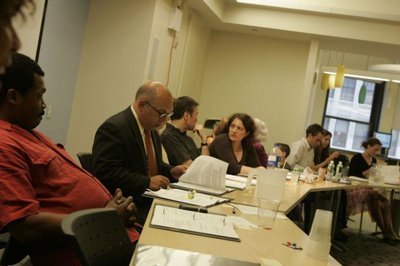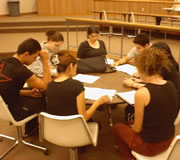 I'm not a professional actor so I'm sticking my neck out on this. I hope the pros will let me know if I don't know what I'm talking about. OK, here goes....
I'm not a professional actor so I'm sticking my neck out on this. I hope the pros will let me know if I don't know what I'm talking about. OK, here goes....Good live action acting is good reading. Acting is not a branch of psychology or dance, it's a type of music. That's why the most important part of rehearsal is the reading. The actors and the director sit around a table, scripts infront of them, and try to find the rhthym of the dialogue. They're like a jazz combo trying to figure out how they all fit together. Some may come out of the reading with a larger role to play and some will come out with a smaller role to play. Sometimes an extra line or an extra character will be mandated. It's all part of the quest to find the overall "sound."
 When I use the word "reading" I'm not only referring to what happens around the table but also to the literal act of reading itself. Good acting is frequently rhetorical and oratorical, even when it's fairly intimate. Thinking about acting as a sort of heightend speech from a podium prevents an actor from getting too precious and emotionally self-indulgent about a line. It reminds him that his main asset is the quality and control of the voice itself. A good actor knows that how you say something is often even more important than what you say.
When I use the word "reading" I'm not only referring to what happens around the table but also to the literal act of reading itself. Good acting is frequently rhetorical and oratorical, even when it's fairly intimate. Thinking about acting as a sort of heightend speech from a podium prevents an actor from getting too precious and emotionally self-indulgent about a line. It reminds him that his main asset is the quality and control of the voice itself. A good actor knows that how you say something is often even more important than what you say.

13 comments:
Bang on Uncle Eddie. Good acting is about the actors being an instrument capable of sounding out the rhythm of the text.
Breath work is very important. Being organic is very important. Everything else comes as an extension of the body and the breath.
Well, that's interesting.
I'm personally certain('personally' because I've never read any acting manuals so don't know if there's a theory there)that if someone is generally musical, they can deliver lines well. Or should be able to--obviously it's but one part of the actor. One great director said that timing was THE most important thing(again--timing--a crucuial part of music in any form, without it music is noise)and actor needed. Everything, all meaning to him in dialogue was timing; he saiid you either had it or you didn't. I tend to believe this is true.
Mainly people judge actorsvia movies, but it's the same for stage performances, imho. btw if you want to see what's for me the all-out, flattest, most unmusical, single worst "performance" in a film--someone who is just hopeless, can't act for beans, check out the model Suzy Parker, in whatever that Cary Grant movie was she did. WOW! NO timing, NO understanding of cues, the other person, emotion, nothing. She was stunning, but was a tree in front of the camera. And ironically, probably very lively and natural in her daily life. But possesed no musicality or timing.
Um, sorry about the #$@#!@ typos. Hee.
This may be a personal bias, but most of my favorite actors are silent (Buster Keaton, Louise Brooks, Lon Chaney). But I think of physical acting as a kind of silent music. Most people don't seem to think of it as acting. I once did a silent role in a student film, and when I showed it to my aunt and asked her what she thought, she said, "I couldn't tell. You didn't say anything."
There doesn't seem to be much emphasis on physical acting, but I see it as an integral part of a great performance. It's fun to isolate the different elements, whether its being completely physical through mime or completely vocal through radio, exerting them on stage or scaling them down on film.
I agree that reading is the first step to finding your rhythm. But I always find that no matter how great a reading goes, there's almost a feeling of starting from scratch the moment you're on your feet.
I taught my self to read (not in the acting sense, just the reading sense) reading comics, and it was generally shocking actually, when those comic characters may have found themselves in animation a few years later... they didn't sound nearly as smart as I gave them credit in my internal voice. (In particular Archie Andrews and Friends, but it applied to Peanuts, and others as well). Of course that was the extra sheen of someone creating a character, but it did not always jibe with me.
This post also makes me think of how much actors used to be identified totally by their voice, and how this ended considerably, when the studio system folded. There are not that many whose career started since the 70's, that are fodder for impressionists (and some impressionists careers would have been better served sticking with the older voices)
I'm not sure what the missing element was between those two eras... perhaps it was the training ground of radio drama being lost.
However, Voice Actors are generally more appealing to me, than the movie stars they pull in to voice animation for marquee value these days. It need not be that way, and not all of the performances are relatively flat, though famous. But it works out that way too often.
Cable: Tom Waits!? I wouldn't be surprised if he could act!
Lee: What does being organic mean?
Charlie: Adams got the mumbling problem right! It's interesting that he has so much to say that his comic strip isn't enough of an outlet.
Jenny: Thanks for the comment about timing! I'll need a whole post to answer so that's what I'll do. I'm dying to see Suzy Parker act...well, maybe just a minute or so of it.
Jeremiah: Physical acting is great! It's not just Jim Carrey and Charlie Chaplin, it's also overweight guys like Jackie Gleason!
Anonymous: True enough! Most of the leading men-type actors used to be people you could do impressions of.
What I don't understand is why radio dropped story-telling so totally. Playing records makes sense because that way someone else pays to make the content but even so, it's odd that drama disappeared so completely.
I'll second a vote for Tom Waits; and again--there's a musician who knows how to use himself for acting(wel, heck, I guess all great musicians are actors, rather than the other way around).
As for silent acting--I'm a big fan of the great (and lesser) ones in that style of film--and guess what? on virtually every set--comedy and drama--all the acting and scenes were shot with a live orchestra on the set off camera. Talk about timing! And they did speak lines, it wasn't all mime(but I know jeremiah knows that). I actually LOVE the special art that's sued (or "technique, style, whatever)in silent film of cutting away to the title as the actor begins to speak...or after he/she finishes a line, or not at all while they speak(albeit silently)back & forth. And silent are a LOT like comics and books in the sense that we attribute voices from our imaginations for the actors/characters. It's really magical.
Hum! Can't wait to read your post on timing, Eddie-san!
Good christ! MY TYPOS!!! AARGH.
Sorry again. I, uh, type a lot faster than I should(or can).
And I hit "publish" too fast, too. : (
Really, this post just explains why radio used to be so great, and how amazing those actors HAD to be. If they didn't have the timing or the rhythm, they didn't work. There was no such thing as a radio actor who's only purpose was to stand around and look sexy. If you couldn't act, you didn't get paid.
I like how you compared acting to music.. it makes a lot more sense to me, hehe. Do you think you'll ever make a post about music? I like discussing film scores on my blog, and John K told me you like Bernard Herrmann. :)
Ya Down By Law is great- beautiful ending shot!
Aggie: I love Bernard Herrmann! Yesterday I listened to his soundtrack for "Jane Eyre" in the car. It added a lot to the story!
Good acting is good doing. Cause acting is doing. Its not the words that are important but the actions behind them that tell the story as it unfolds.
Post a Comment